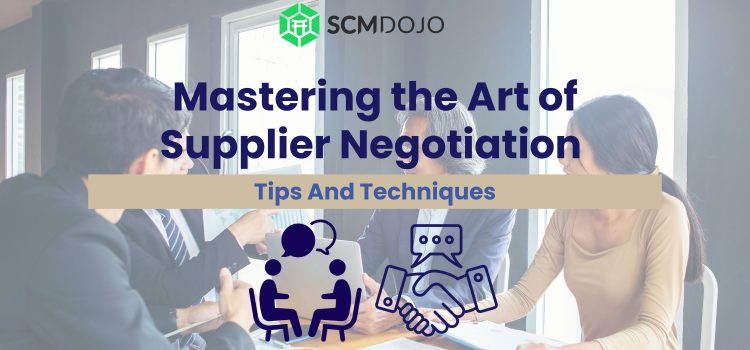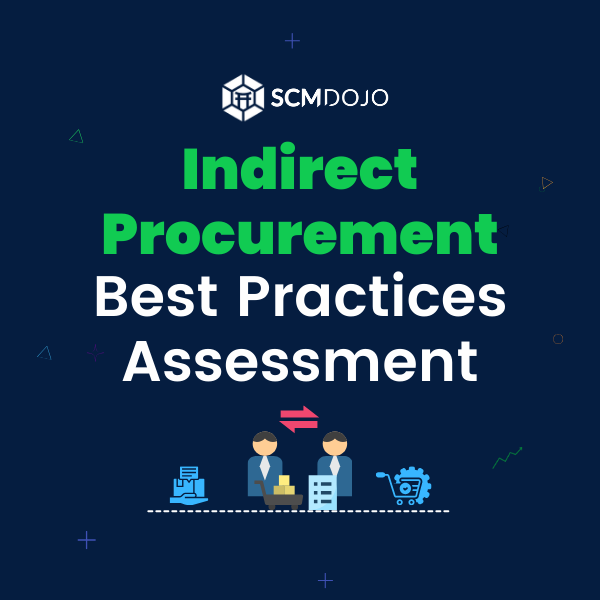Supplier negotiation is the most critical skill in the world of procurement. Effective supplier negotiations are not limit to the best price but a mutually beneficial agreement from both parties that can have a profound impact on the company. It is a skill that needs a strategic approach and it is not something anyone can do. It requires an in-depth knowledge of procurement processes to be able to bring the supplier to a mutual agreement. If you need to learn the art of negotiation, this is just the right blog for you as it is a compilation of comprehensive strategies to master procurement:
[Read More: 6 Essential Procurement Training Courses for Professionals: How To Begin and Advance Your Career in Procurement]
This Article Covers:
- The 12 types of procurement negotiation
- The 8 stages of supplier negotiation
- Leveraging technology and legal expertise in vendor negotiation
The 12 Types of Procurement Negotiation
In procurement, negotiations are essential for securing favorable terms and agreements with suppliers. The following are common types of negotiation in procurement:
1. Price Negotiation:
This negotiation focuses on haggling over the cost of goods or services to obtain the best price for procuring products or services.
2. Contract Negotiation:
This negotiation involves discussions and agreements on the terms and conditions of the procurement contract. These terms may include delivery schedules, quality standards, payment terms, and penalties.
3. Supplier Selection Negotiation:
Negotiating with potential suppliers to determine which one will be awarded the contract based on factors such as quality, price, and reliability.
4. Volume or Quantity Negotiation:
This negotiation involves discussing the quantity or volume of goods or services to be procured. The aim is often to secure volume discounts or advantageous terms.
5. Payment Terms Negotiation:
Determining the payment schedule, methods, and other financial terms that best suit both the buyer and the supplier.
6. Quality and Specification Negotiation:
Ensuring that the procured products or services meet the required quality and specification standards.
7. Delivery and Lead Time Negotiation:
Negotiating the timeframes for delivery and lead times to ensure timely supply without disruptions.
8. Risk Mitigation Negotiation:
This negotiation involves discussing strategies and terms to manage and mitigate risks associated with procurement. These risks may include supply chain disruptions and quality issues.
9. Long-Term Supplier Relationship Negotiation:
Focused on establishing a long-term relationship with a supplier, this negotiation may include agreements for continuous improvement, innovation, and cost reduction.
10. Sustainability and CSR Negotiation:
Negotiating terms related to sustainability, corporate social responsibility (CSR), and ethical sourcing. This may include environmental and social responsibility standards.
11. Price Escalation Negotiation:
Addressing situations where price escalation clauses are included in the contract, ensuring that they are fair and reasonable.
12. Alternative Sourcing Negotiation:
This negotiation explores alternative sourcing options when necessary.
The 8 Stages of Supplier Negotiation
1. Pre-negotiation work
Before you are going to sit with the supplier, you need to be prepared. Mainly that includes having set objectives and goals and, clear understanding of what you need the supplier to settle on.
Defining Your Objectives:
Having clear objectives is the first thing before you start the negotiation. What matters the most to you in this procurement? Is it the cost? Do you need to have the procurement on your payment terms? Or Do you need to build a stronger and long term relationship with the supplier? Once the goal is defined, then you work on achieving it.
Market Research:

Supplier Analysis:
To negotiate with someone, you need to know their strengths and weaknesses. The right way of doing it is to read up on their history, finances, and their reputation in the market. This research will give you valuable insight into your potential supplier.
2. Understand Your Leverage
You can have various leverages that will benefit you during negotiation. But for that, you need to recognize where your leverage lies. It could be:
Volume and Scale:
You are on considerable leverage if you are buying in bulk. Since the supplier is getting more business from you, he will be offering you better prices and terms.
Unique Requirements:
Unique requirements can also give a sense of challenge to your suppliers and they will put in more effort to secure your business.
Alternative Suppliers:
This is a very common leverage in procurement if you have various considerable options to get your requirements met, the suppliers are going to offer you better offers or discounts. Negotiating with them becomes easier when they know you have other options.

3. Communication and Relationship Building
Negotiation is all about effective communication. If you build a good rapport with your supplier, it is more likely that the suppliers will cooperate with you and you will be successful in effective supplier negotiation.
Set Expectations:
Suppliers appreciate transparency. So if you want to have a successful negotiation, you need to be vocal about your requirements, expectations, objectives and what are you hoping to achieve. Clarity is essential for effective communication.
Actively Listen:
While you are communicating your needs, you need to understand the supplier’s needs as well. Effective negotiations and communication need to be two-way. Active listening helps you build trust.
Transparency:
As mentioned earlier, transparency is appreciated because when your priorities and limitations are clear and defined, it is more likely to result in a productive discussion. Be honest about your alternatives too.
4. Win-Win Approach
A win-win situation is what you should aim for. The whole point of negotiation is to settle on a mutually agreed solution that is beneficial to both.
Look Beyond Price:
Oftentimes price is the only element organizations focus on while negotiating. Let me tell you that sometimes negotiating other things like payment terms, quality standards, delivery schedules, and after-sales service, etc. can be more beneficial than the price only.
5. Negotiate More Than Just Price
As mentioned above, it is crucial to negotiate other elements related to procurement other than the price. These are:
Payment Terms:
Payment terms can be negotiated such as credit terms, extended payment periods, discounts, etc.
Delivery Schedules:
It is very important to discuss delivery schedules according to your company’s operational needs.
Quality Standards:
Negotiation must also include a discussion of standards of quality required by your company. This helps you maintain the consistency of your product or service.
6. Track Progress
Effective negotiation also includes benchmarking your supplier’s performance so you can negotiate based on facts and data.
Key Performance Indicators (KPIs):
KPIs need to be identified to keep a record of supplier performance. This will help you to assess agreed terms with the supplier regularly.
Data-Driven Negotiation:
When the record is maintained for the previous orders, you will know which points can be leverage for effective negotiations.
7. Develop Alternative Options
This is a big leverage point that gives you an upper hand during negotiations. Alternative supplier or other solutions gives you an advantage due to which suppliers are likely to consider your needs and fulfill your demands.
Maintain a Network:
The suppliers who have the potential to be beneficial to the company throughout the company life, you need to maintain long-term relationships.
Stay Informed:
Markets are always drastically changing, you need to be aware of the newest trends and conditions. This knowledge will give you a fair idea of negotiation success.
8. Build and Maintain Relationships

Open Communication:
Suppliers should be given an open platform to communicate. Effective communication must be transparent as it is an important part of supplier negotiation.
Regular Feedback:
Suppliers can work efficiently if they are provided with constructive feedback. Positive feedback will motivate them and you must give suggestions so they can improve.
Long-Term Partnership:
You must develop a long-term and good relationship with the supplier as it will also help in future negotiations.

Leveraging Technology and Legal Expertise
Leverage Technology

E-Sourcing Platforms:
E-sourcing platforms exist to ease the negotiation process. The platforms make it transparent. It becomes a centralized platform where suppliers can interact and communicate openly increasing efficiency.
Data Analytics:
Data is a good source to make informed decisions and identify more opportunities. These insights are more efficient and resourceful. The efficiency and effectiveness improve with data-driven insights.
Automation:
These are the tools to take care of the monotonous or regular negotiation tasks. This saves time and energy for your procurement team to focus on other strategic elements during a negotiation process.
Leverage Legal Expertise
You will need to involve legal expertise when you are going through a high-stake negotiation. The legal people are responsible for taking care of loopholes in the contract, their compliance, protecting your needs, and other legal requirements.
Contractual Agreements:
Legal bodies ensure compliance of the law and protect your rights. They can review and draft the contracts for you.
Regulatory Compliance:
Legal experts are a helpful resource for taking care of your regulatory requirements.
Mastering the Art of Supplier Negotiation
Supplier negotiation is an art. It is a skill that needs to be developed and can be learned through various resources. Negotiation to be effective requires careful preparation, set objectives, and effective communication while following a strategic approach. You can learn this art by following the comprehensive strategies described in this blog.
Here are more exciting Blogs to go through to ace your procurement strategies!
Sustainable procurement goes beyond simply sourcing eco-friendly materials; it encompasses a holistic approach that takes into account ethical labor practices, fair trade, and carbon footprint reduction. Read more….


About the Author – Dr Muddassir Ahmed
Dr Muddassir Ahmed is the Founder & CEO of SCMDOJO. He is a global speaker, vlogger, and supply chain industry expert with 17 years of experience in the Manufacturing Industry in the UK, Europe, the Middle East, and South East Asia in various Supply Chain leadership roles. Dr. Muddassir has received a PhD in Management Science from Lancaster University Management School. Muddassir is a Six Sigma black belt and founded the leading supply chain platform SCMDOJO to enable supply chain professionals and teams to thrive by providing best-in-class knowledge content, tools, and access to experts.
You can follow him on LinkedIn, Facebook, Twitter or Instagram.
Recommended Reading:
Essentials of Negotiation – 6th Edition
Author: Roy Lewicki, Bruce Barry, and David Saunders
Why we recommend: Having excellent negotiation skills is key to getting the best deal for a product. I highly recommend this book, “Essentials of Negotiation,” which provides superb illustrations of the concepts being described, thereby adding to your understanding of the multi-dimensional art of negotiation.
This procurement book will help you develop your negotiation skills with ease and efficiency, building your confidence in the process. It is a must-read for anyone looking to improve their negotiation skills and achieve better results in their procurement activities.
Read More: 10 Best Procurement Books of 2023 To Look Out For








